
A blank wall of social and professional antagonism faces the
A blank wall of social and professional antagonism faces the woman physician that forms a situation of singular and painful loneliness, leaving her without support, respect or professional counsel.






"A blank wall of social and professional antagonism faces the woman physician that forms a situation of singular and painful loneliness, leaving her without support, respect, or professional counsel." These words from Elizabeth Blackwell, the first woman to receive a medical degree in the United States, are a poignant reflection on the barriers that women have faced throughout history, particularly in the pursuit of knowledge, respect, and equality in professions that have long been dominated by men. Blackwell's words capture the loneliness and isolation that many women in the medical field experienced, and, to some extent, still experience today. It is not just the lack of respect for their skills but the profound lack of support that creates an environment in which women have to fight not just for professional success but for acceptance itself.
In the ancient world, the struggles of women were often overlooked, and their contributions were frequently undervalued or denied. The Greek philosophers, particularly Aristotle, believed that women were naturally inferior to men in both intellect and moral strength. These views were so ingrained that women were largely excluded from intellectual and professional pursuits. Hypatia of Alexandria, a philosopher and mathematician in ancient Egypt, was one of the few exceptions. She taught astronomy, mathematics, and philosophy to both men and women, yet her position as a female intellectual was constantly under threat. Hypatia's eventual tragic death illustrates the dangers women faced when they challenged societal norms, even in the pursuit of knowledge. Blackwell's own journey into the field of medicine echoes Hypatia's courage—pushing through a blank wall of antagonism and opposition to forge a path for herself and others.
Blackwell’s experience can be seen as part of a much larger narrative, stretching from the ancient world to the present day. Her loneliness as a woman physician was not simply a personal struggle but part of a broader cultural and historical context that denied women the respect and support they deserved. In medieval times, women who sought to practice medicine were often seen as witches or heretics, their medical knowledge and abilities dismissed as illegitimate. The sisterhood of women who practiced medicine in secret, passing down knowledge from mother to daughter, was a subversive act in a world where authority lay in the hands of men. As Blackwell broke through that wall, she was not just claiming space for herself but laying the foundation for future generations of women to enter professions that were traditionally denied to them.
The story of Elizabeth Blackwell is one of resilience, determination, and an unyielding belief in the value of knowledge. When she applied to medical schools, she faced rejection from multiple institutions simply because she was a woman. But she refused to be deterred, and through a combination of persistence and sheer force of will, she earned her place in Geneva Medical College in New York, where she became the first woman to receive a medical degree in 1849. Her struggle was not just for herself but for the countless women who would follow in her footsteps, even if the blank wall of antagonism remained in place. Through her courage, she demonstrated that the path to progress is often filled with obstacles, but that persistence in the face of adversity can ultimately lead to triumph.
Even as Blackwell’s achievement was monumental, it highlighted a painful truth that women in male-dominated professions continue to face: isolation. After earning her medical degree, Blackwell struggled to gain acceptance from her peers in the medical field, and the social and professional rejection she faced left her without the support that would be readily available to her male counterparts. Her experience mirrored that of countless women throughout history who achieved great things but were denied the recognition and respect they deserved because of their gender. The blank wall that Blackwell spoke of was not just a personal barrier but a reflection of the systemic prejudice that existed in many societies, preventing women from achieving their full potential.
The lesson of Blackwell’s words is one of unrelenting resilience. Just as Blackwell shattered barriers and paved the way for future women in medicine, so too must we break down the walls of inequality and oppression that continue to exist in various aspects of our lives. The blank wall of antagonism may remain, but with each woman who rises to challenge it, with each woman who dares to enter a field where she is not welcome, the wall becomes weaker. The loneliness that Blackwell spoke of is not the end but the beginning of a path towards solidarity and support. In the end, the support and respect that women have long been denied can only be achieved through the shared efforts of all those who believe in equality and justice.
In our own lives, we must continue the fight that Blackwell began—to respect and uplift those who are often denied their rightful place in society. We must challenge the walls of antagonism in our communities, workplaces, and personal lives, and provide the support and respect that allow each person—regardless of gender, race, or background—to thrive. Just as Blackwell's courage led to a ripple effect in the history of women's rights, so too must our actions lead to lasting change for those who are often pushed aside. May we be inspired by her example, and may we continue to build a world where respect, support, and dignity are extended to all, ensuring that no one ever has to face the painful loneliness that Blackwell once did.






AAdministratorAdministrator
Welcome, honored guests. Please leave a comment, we will respond soon